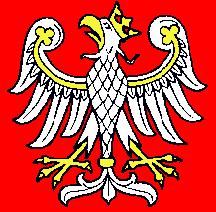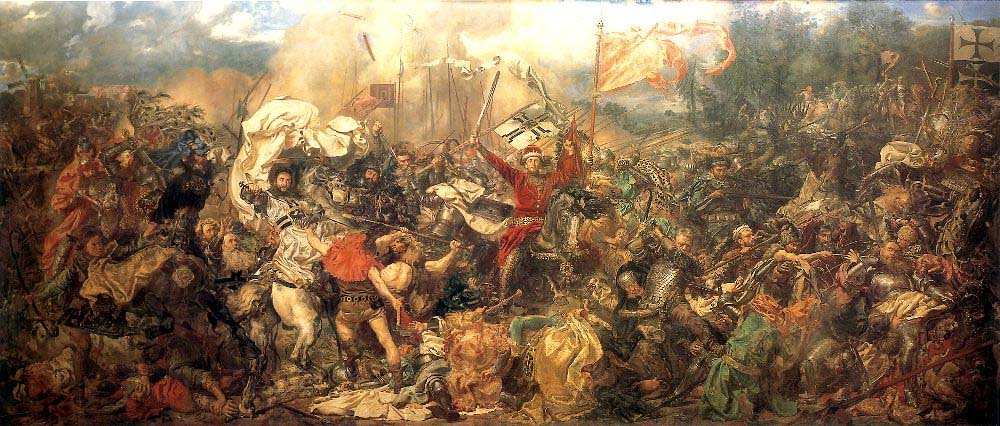The World's First International Summit of World Leaders
King Kazimierz (Casimir) the Great was undoubtable one of the greatest kings of Poland. It is said that "Casimir found Poland wooden and left it built of bricks." Not only is he remembered as a great builder, but he began one of the earlist universitys in Eastern Europe, and presided over one of the first internation summits of World Leaders.
King Casimir III did establish one of the first universites in Europe, in Kraków (Cracow), known now as the Jagiellonian University. One of its early alumni was Nicolaus Copernicus, who changed the human perception of the Universe. Casimir the Great is also known as the host of the first international Summit of World Leaders.

Banner of Kazimierz (Casimir) the Great The participants were Charles IV, Holy Roman Emperor, King Louis I of Hungary, King Valdemar IV of Denmark, King Peter I of Cyprus, Siemowit III of Masovia, Bolko II of Swidnica, Wladyslaw Opolczyk, Rudolf IV, Duke of Austria, Bogislav V, Duke of Pomerania, Casimir IV, Duke of Pomerania, Otto V, Duke of Bavaria and Louis VI the Roman.
The Summit discussed matters involving approaching Turkish threats to Europe, peaceful resolution of conflicts between the European Powers and the House of Anjou succession to the Polish throne (Casimir didn't have any legitimate children and was the last of the Piast Dynasty). The feast for the Emperors, Kings and Dukes lasted, supposedly, for 21 days and was very impressive.
Casimir is also known as the Protector of the Jews and as the king who gave up much of his royal powers to the nobility. His good intentions resulted later into a decline into a peculiar "noble democracy" and the eventual demise of the Commonwealth of Both Nations. In should be noted that the Polish noble class numbered up to more than 10% of the total population, in contrast to 1-3 % in the demography of the Western European countries. He also blamed for the loss of Silesia for several hundreds of years.
| Top of Page | Return to "Flags of Poland" |
The Woman Who Became King and then was Sainted
King Casimir the Great made arrangements to have his nephew, King Ludwig of Hungary to succeed him to the Polish throne, which he did between 1370 and 1384. After the death of Ludwig, his daughter Mary became the Queen of Hungary, but the Polish nobles didn't want her to rule in Poland. After intense negotiation they managed to get enthroned the younger sister of Mary, Jadwiga (Hedwig) as the "King of Poland." She was named King (Hedvig Rex Polonić) because the term "Queen Regnant" was rejected in Poland.
Jadwiga hailed from the Andegavin family, House of Anjou, which produced many Christian rulers of the European countries. She was a devout, pious Roman Catholic, and very well educated. For a year she had ruled alone and in 1385, under the guidance of the nobility, she did agree to marry Jogaila, the Grand Duke of Lithuania, on the premises he would convert to Christianity, not only himself, but with his entire nation, last pagans of Europe. She considered this her greatest good deed, that of bringing an entire nation to the fold of Christianity.
|
|
|
Banner of Hedwig (Jadwiga) Anjou |
|
Banner of Wladyslaw II Jagiello |
Jogaila, who was baptized as Wladyslaw II, became known in Poland as Jagiello. After becoming the King of Poland, he relinquished his title and post of the Grand Duke of Lithuania to a former adversary, Witold (Vytautas the Great). Witold, reconciled with Jagiello, commanded the Polish-Lithuanian forces (with the Tatars, Czechs and Ruthenians) on the actual battlefield at Grunwald in 1874. He is pictured splendidly on this famous painting by Jan Matejko.

Battle of Grunwald by Jan Matejko
Jadwiga retained her title of the King and until her death in 1399. She co-ruled the country with her husband, and although having little influence in the politics of the country, she devoted her attention to the charity and education, spending her wealth on the restoration of the Cracow University, scholarships and helping the poor. On June 6, 1997, Pope John Paul II canonized Jadwiga and later she was declared the "Patron Saint of the Unified Europe."
| Top of Page | Return to "Flags of Poland" | Return to "Vexillological Essays and Chart Pages Menu" |